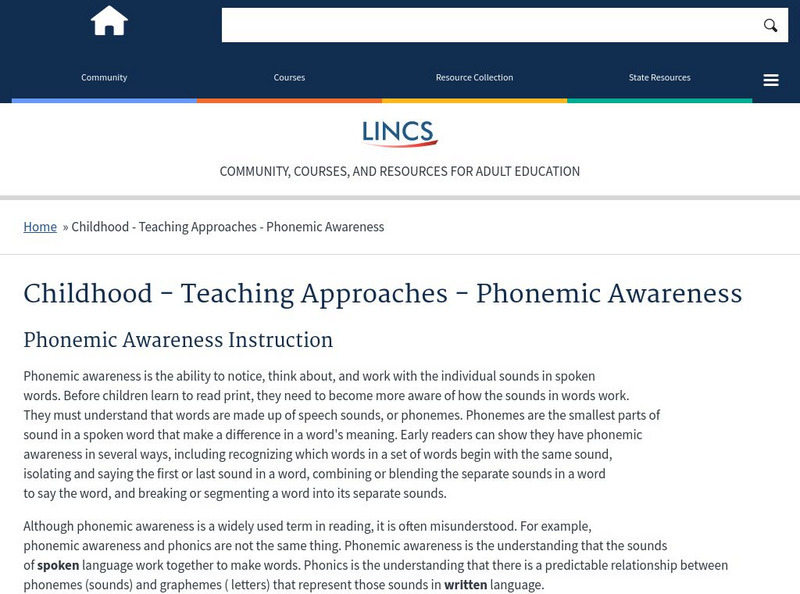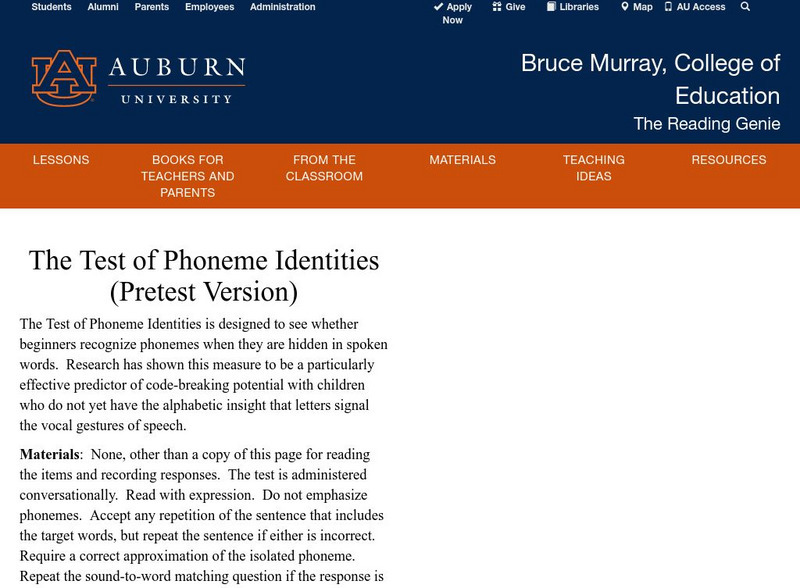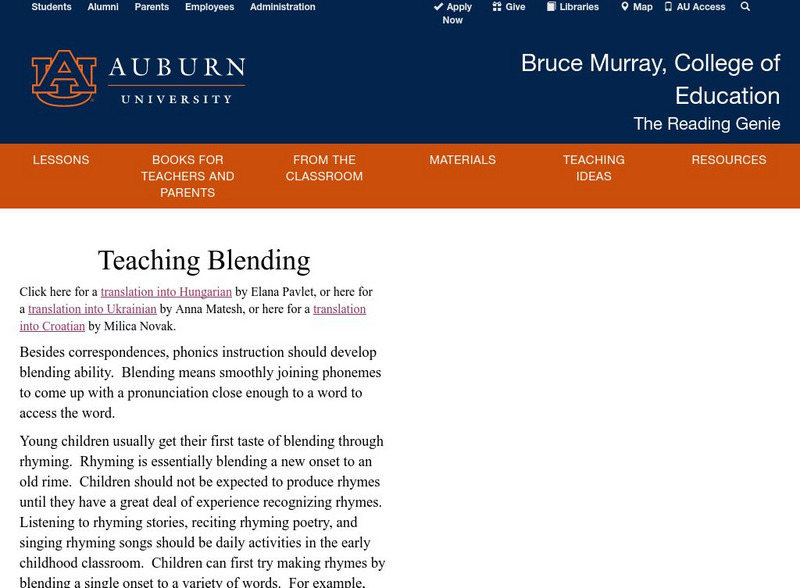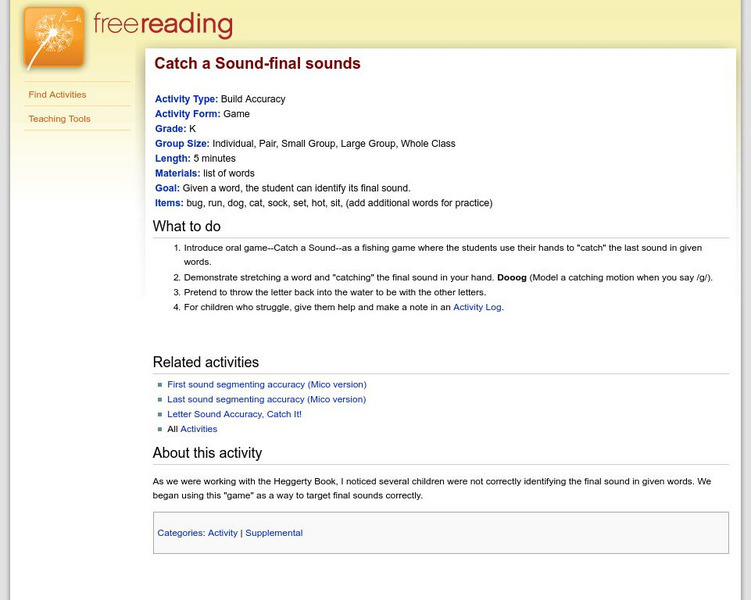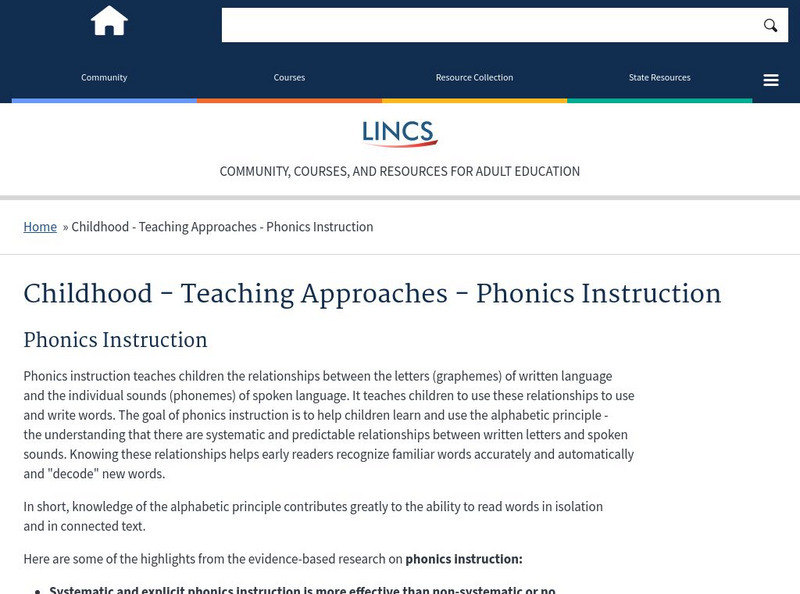Reading Rockets
Reading Rockets: Reading Basics: Phonological and Phonemic Awareness
Before children learn to read print, they need to become aware of how the sounds in words work. They must understand that words are made up of individual speech sounds, or phonemes. A child's skill in phonemic awareness is a good...
Reading Rockets
Reading Rockets: Teaching Reading: Expert Interviews
Learn from nationally known researchers and experts in literacy and early education. Topics include phonemic awareness, phonics, vocabulary, spelling, comprehension, writing, summer learning, early childhood education, dyslexia, and more.
Other
Phonemic Awareness, Alphabetics and Sight Words
Discover more about phonemic awareness when you visit this informative site. This resource features activities that teach phonemic awareness and activities that teach alphabetics.
Kidsource OnLine
Phonemic Awareness: Important Early Step to Reading
This site features an article that looks at the importance of phonemic awareness as an early step to learning to read. Teachers will benefit from the information presented within this article.
Los Angeles County Office of Education
Teams: Phoneme Awareness Assessment Tools: Final Sounds
Here are two tools to use in assessing student understanding of final sounds. One deals with phoneme isolation and one deals with phoneme matching.
LD Online
Ld Online: Learning Disabilities Online: Phoneme Awareness Activity
What do you know about phoneme activities for collaborative classrooms? This site will show how to develop your own activities to sharpen your students phonemic awareness skills. This informative resource will support any teacher's work...
US Department of Education
U.s. Department of Education: Teaching Approaches: Phonemic Awareness
What is phonemic awareness? Check out this site to learn more about phonemic awareness. Teachers can gain an overview of this topic when they visit this resource.
Auburn University
The Reading Genie: Making Friends With Phonemes
This article provides suggestions for teaching children to understand and begin to manipulate phonemes.
Auburn University
Assessing Phoneme Awareness and Decoding
How do you assess phoneme awareness and decoding? Use this site to find the answer to this question on phoneme awareness and decoding.
Free Reading
Free Reading: Listen for My Sound. A Phoneme Segmenting Activity
A simple, yet effective activity to teach students to identify the same sounds in different words. The teacher says a word and the students give a thumbs up or thumbs down. This site also includes a Word Generator list link as a resource.
Reading Rockets
Reading Rockets: Reading 101: A Guide to Teaching Reading and Writing
Reading 101 is a self-paced professional development course for K-3 teachers. It presents some of the core information that teachers need to help young children learn to read and write well and to support the children who struggle. The...
Auburn University
Auburn University: The Test of Phoneme Identities (Pretest Version)
The 38 question test can be used to pre-assess primary students' ability to identify phonemes.
Auburn University
Auburn University: Teaching Blending
How do you teach your students to develop a blending ability through phonics instruction? This site features information to help get you started in your quest for this goal. According to this article you can begin with rhyming. Come and...
Curated OER
The Reading Genie: Teaching Blending
Suggestions of ways to help students learn to blend phonemes to make real or nonsense words. Dr. Murray explains both onset-rime and body-coda methods of blending.
Free Reading
Free Reading: Catch a Sound: Final Sounds Game
This site contains a flexible activity that teaches students how to "catch" or identify the final sound of a word.
Free Reading
Free Reading: Bingo: Identifying and Generating Rhyming Words
A version of Bingo! that teaches students to differentiate between words that rhyme. The site includes links to bingo boards and rhyming pictures.
US Department of Education
U.s. Department of Education: Teaching Approaches: Phonics Instruction
Explore the world of phonics instruction. Students and teachers can benefit from this informative site, which outlines a phonics instruction plan.
Free Reading
Free Reading: Guess What I'm Thinking?: Initial Sound Accuracy
A version of the "20 Questions" game. The instructor tells the class he is thinking of something that starts with, for example, /b/. The students have to come up with what the teacher is thinking of.
Auburn University
Auburn University: Decoding Glossary
What do you know about teaching decoding skills to your students? Do you ever get stumped by some of the words that go along with decoding? If you answered yes to any of these questions then come and check out this decoding glossary.
Reading Rockets
Reading Rockets: Reading Basics
Provides a wealth of basic information on how to teach kids to read. Covers print awareness, sounds of speech, phonemic awareness, phonics and decoding, fluency, vocabulary, and lots more.
University of Oregon
Big Ideas in Beginning Reading
The goal for teachers from the academic content standards is every child to be reading by 3rd grade. This site will help teachers to teach the "big ideas" in reading: phonemic awareness, alphabetic principle, fluency with text,...
Better Lesson
Better Lesson: What Do You Hear?
Celebration words can be used to help young scholars review and practice beginning sounds. This lesson plan will help students recognize and produce the initial sound of a given word. Included are an assessment checklist, videos of the...
Better Lesson
Better Lesson: Match That Pie
Knowing the relationship between written letters and spoken sounds will help children recognize words accurately and automatically. In this lesson plan, children practice matching letters with initial sounds.
Other
Sounds of English
A comprehensive site on English pronunciation for English language learners and their teachers. It offers explanations and activities for pronunciation of specific sounds, of letter combinations, of word stresses, and of phrasal words....



